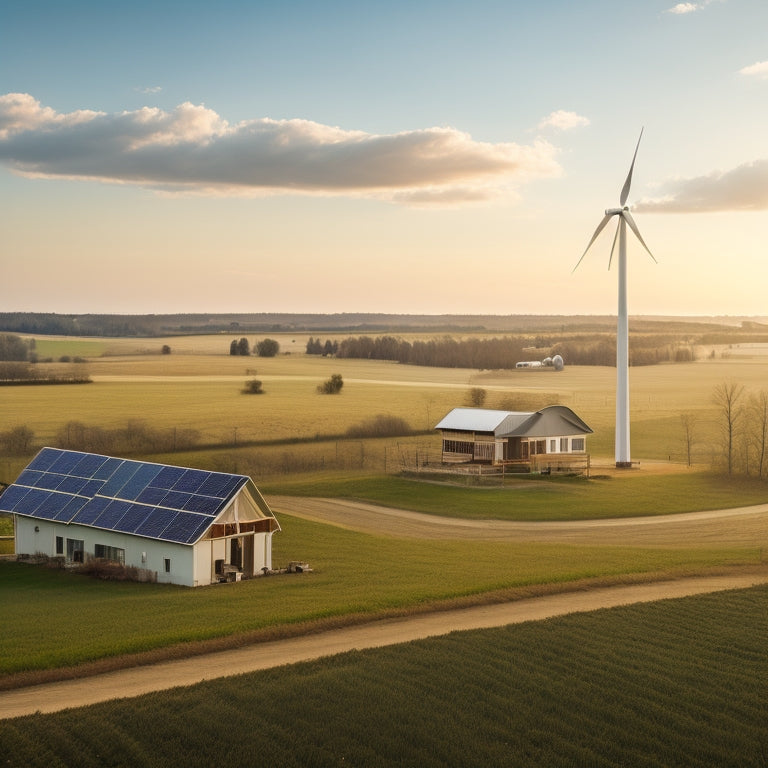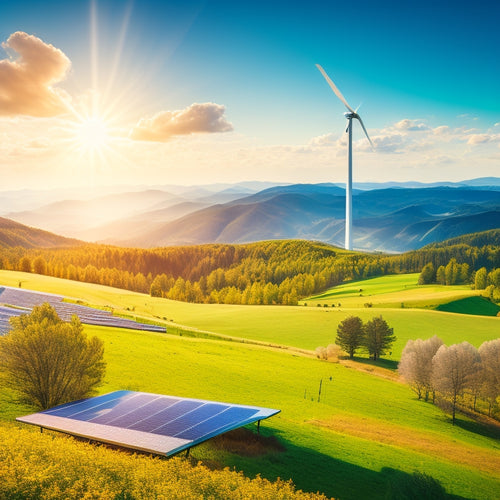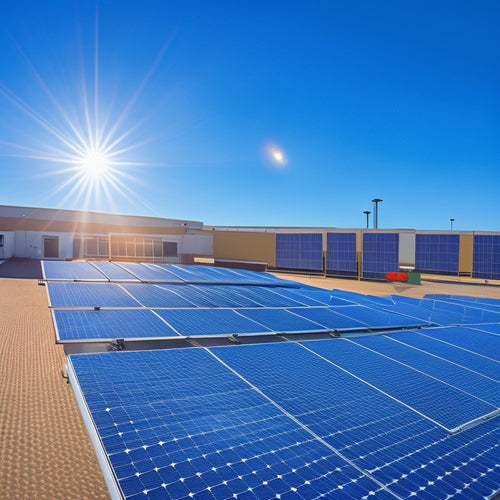
5 Essential Renewable Energy Storage Solutions for Rural Areas
Share
You're likely to rely on renewable energy storage solutions to power your rural home or community, considering the vast distances and limited grid connectivity in these areas. Five essential solutions stand out: battery systems for off-grid homes, providing grid independence and a reliable power source. Solar-powered water pumping solutions harness the sun's power, increasing water availability while reducing energy costs. You'll also benefit from energy storage for rural communities, advanced wind turbine technology, and hybrid renewable energy systems that combine different power sources. These solutions can optimize your energy infrastructure, and there's more to explore in how they can improve your rural energy setup.
Key Takeaways
• Deep Cycle batteries provide reliable energy storage for off-grid homes, enabling independence from the grid and reducing fossil fuel reliance.
• Solar-powered water pumping solutions store excess energy, reducing energy costs and increasing water availability in rural areas.
• Energy storage systems optimize water pumping needs with solar power, ensuring a reliable power supply for rural communities.
• Hybrid renewable energy systems combine different power sources, reducing energy fluctuations and promoting sustainable development in rural areas.
• Advanced wind turbine technology with larger rotors and improved aerodynamics increases energy production, reducing costs and enhancing rural energy infrastructure.
Battery Systems for Off-Grid Homes
Installing battery systems in off-grid homes enables you to store excess energy generated by renewable sources, such as solar or wind power, for later use during periods of low energy production. This allows you to enjoy grid independence, relying less on public utilities and more on your own renewable energy harvesting capabilities.
When choosing a battery system, consider Deep Cycle batteries, designed specifically for off-grid applications. These batteries are built to withstand the demands of daily charging and discharging, providing a reliable source of power when you need it most.
By incorporating a battery system into your off-grid home, you'll experience greater energy autonomy and reduced reliance on fossil fuels. With the ability to store excess energy, you'll be prepared for periods of low energy production, ensuring a stable and consistent power supply.
Solar-Powered Water Pumping Solutions
By harnessing the power of the sun, you can pump water from wells or reservoirs to meet your rural area's irrigation, livestock, or household needs, all while reducing your reliance on fossil fuels and lowering your carbon footprint. Solar-powered water pumping solutions are an ideal choice for rural areas, where access to grid electricity may be limited. These systems can provide a reliable and sustainable source of water for farm irrigation, livestock, and household use, ensuring water security for your community.
Some key benefits of solar-powered water pumping solutions include:
-
Increased water availability: Solar-powered pumps can provide a consistent supply of water, even in areas with limited access to grid electricity.
-
Reduced energy costs: By harnessing the power of the sun, you can notably decrease your energy costs and reliance on fossil fuels.
-
Improved water security: Solar-powered water pumping solutions can provide a reliable source of water for farm irrigation, livestock, and household use, ensuring water security for your community.
Energy Storage for Rural Communities
As you've optimized your water pumping needs with solar power, you're now poised to tackle the next hurdle in rural energy development: efficiently storing excess energy generated during the day for use during periods of low sunlight or at night.
Energy storage is essential for ensuring a reliable and consistent power supply in rural areas, where grid connectivity can be limited or non-existent. A well-designed microgrid can help you achieve this goal.
By integrating energy storage systems into your microgrid design, you can store excess energy generated during the day and use it to power your rural community during periods of low sunlight or at night. This approach enables rural electrification, providing a reliable and sustainable source of energy for rural communities.
With energy storage, you can overcome the intermittency of renewable energy sources, ensuring that power is always available when needed. By adopting energy storage solutions, you can realize the full potential of renewable energy and bring reliable power to rural areas.
Advanced Wind Turbine Technology
When exploring ways to optimize your energy portfolio, it's crucial to take into account the advancements in wind turbine technology. These innovations can greatly enhance turbine efficiency, leading to increased energy production and reduced costs.
Some of the key benefits of advanced wind turbine technology include:
-
Larger rotors: Larger rotors capture more energy from the wind, resulting in higher energy production and reduced visual impact.
-
Advanced blade designs: New blade designs improve aerodynamics, reducing drag and increasing energy capture.
-
Smart sensors and analytics: Real-time monitoring and data analysis enable predictive maintenance, reducing downtime and optimizing performance.
Hybrid Renewable Energy Systems
You can greatly enhance the reliability and efficiency of your rural energy infrastructure by integrating hybrid renewable energy systems that combine different power sources. By combining solar, wind, and hydro power, you can reduce your dependence on fossil fuels and minimize energy fluctuations. Hybrid systems can be designed to optimize energy production based on weather patterns, seasonal changes, and energy demand. This is particularly important in rural areas where energy demand can be pivotal.
Microgrid designs play a significant role in hybrid renewable energy systems, enabling the integration of multiple power sources and energy storage solutions. Energy forecasting is also essential in predicting energy demand and adjusting energy production accordingly. By leveraging advanced weather forecasting and machine learning algorithms, you can optimize energy production and reduce energy waste.
Hybrid renewable energy systems can provide a reliable and efficient energy supply, even in areas with limited grid connectivity. By adopting these systems, you can reduce energy costs, increase energy independence, and promote sustainable development in rural areas.
Frequently Asked Questions
How Do Renewable Energy Systems Impact Local Wildlife and Ecosystems?
As you explore renewable energy systems, you'll find they can disrupt local habitats, causing species migration, and altering ecosystems, highlighting the need for careful planning and environmental assessments to mitigate these impacts.
Can Renewable Energy Systems Be Insured Against Natural Disasters?
You can protect your renewable energy systems from natural disasters by investing in disaster insurance, which enhances climate resilience by providing financial security and ensuring business continuity in the face of unforeseen events.
What Are the Job Opportunities Created by Rural Renewable Energy Projects?
You'll find that rural renewable energy projects create job opportunities in the rural workforce, from installation and maintenance to management roles, often through energy cooperatives that empower local communities to develop their own sustainable energy systems.
How Do Renewable Energy Systems Affect Property Values in Rural Areas?
As you consider rural renewable energy systems, you'll find that property values can be positively impacted by well-designed installations that blend into rural aesthetics, fostering community acceptance and preserving scenic views.
Are There Any Government Incentives for Rural Renewable Energy Adoption?
You can benefit from government incentives for rural renewable energy adoption, such as Rural Grants and Energy Subsidies, which reduce costs and increase feasibility, making clean energy more accessible and affordable for rural communities.
Related Posts
-

Solar Phone Chargers for Camping Essentials
Solar phone chargers are must-haves for your camping essentials, allowing you to stay connected while enjoying nature...
-

Renewable Energy Solutions to Reduce Your Carbon Footprint
To reduce your carbon footprint, adopting renewable energy solutions is key. Using solar panels or wind turbines can ...
-

Essential Solar Panel Mounts for Commercial Properties
When it comes to essential solar panel mounts for your commercial property, durability and wind resistance are key fa...


